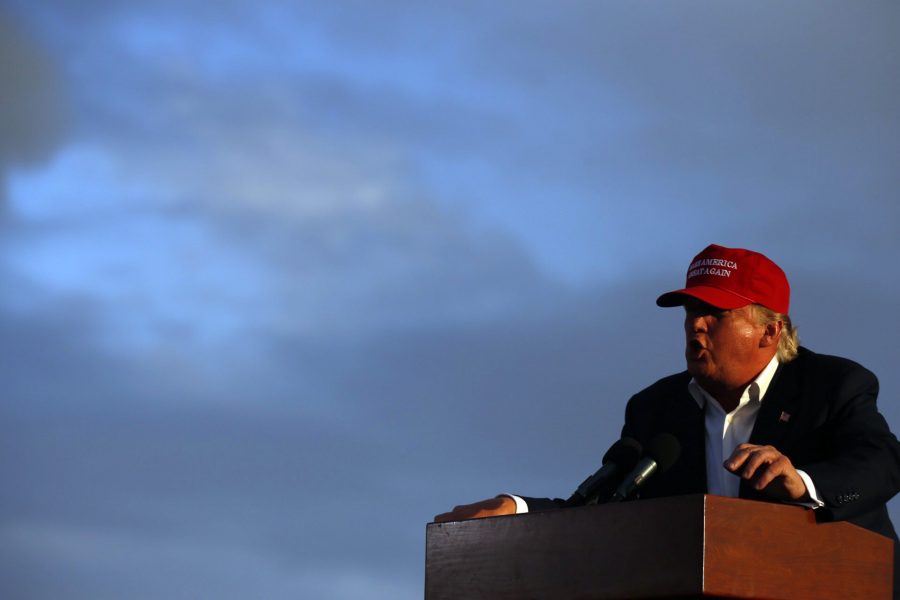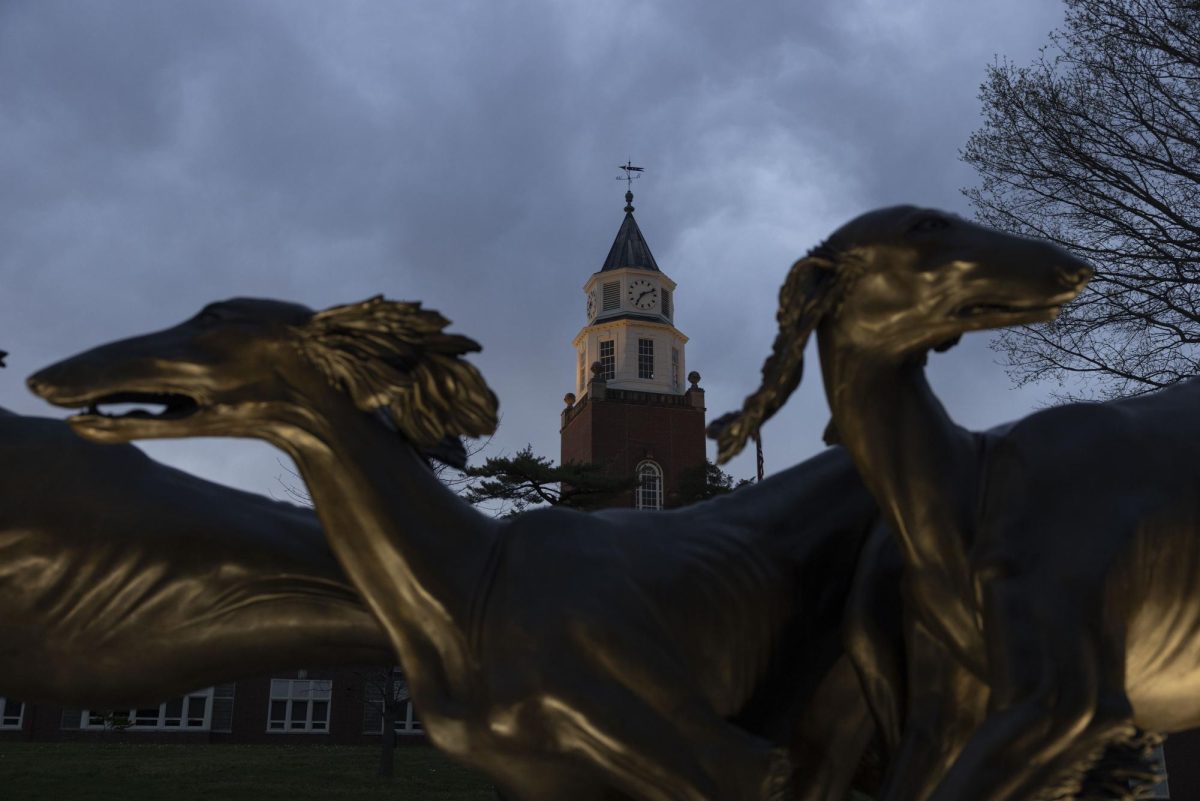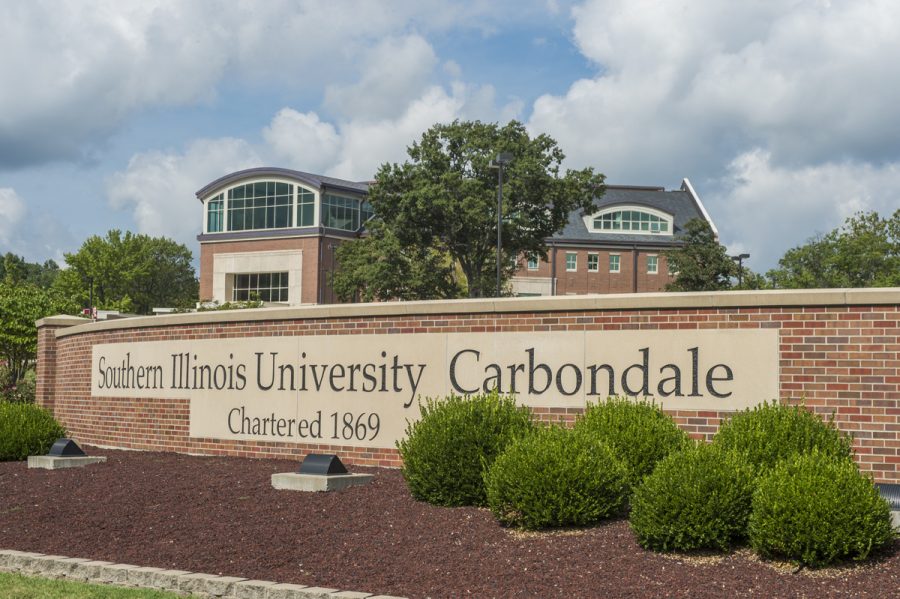Immigrants, advocates say old fears rising to the surface
Donald Trump makes a campaign stop aboard the USS Iowa battleship in Los Angeles on Tuesday, Sept. 15, 2015. (Francine Orr/Los Angeles Times/TNS)
March 6, 2017
Jon Mitchell broke a language barrier with a hug on the one-month anniversary of President Donald Trump’s executive order that focused on broadening the focus of deportations.
The New Bedford mayor opened an immigration community forum in front of a room filled with mostly Portuguese and Spanish speaking residents on Feb. 25 by embracing Helena DaSilva Hughes, the executive director of the Immigration Assistance Center.
“You need to figure out who you can trust,” he said before embracing DaSilva Hughes.
Advertisement
It drew a laugh from the crowd of about 100, but Mitchell reiterated, “I’m not kidding.”
DaSilva Hughes conducted the session that included the Massachusetts Attorney General’s office and an immigration lawyer to inform immigrants of their rights.
Assistants carried chairs into the second floor room throughout the 2-hour presentation at 58 Crapo St. They soon ran out of space and the overflow of people leaned against a wall or listened from the hallway.
“I’m humbled and troubled by the turnout,” Mitchell said. “I’m troubled by how anxious the community is. I’m anxious because people in my community are anxious.”
Trump’s executive order expanded the group of immigrants that are deemed a priority for removal. In the past, only undocumented immigrants that were convicted of a crime were viewed as a priority. Now, an undocumented immigrant that’s charged with a crime or has been witnessed committing a crime are priority for removal.
“I’m really kind of disappointed and distressed about it,” Corinn Williams, the executive director of the Community Economic Development Center, said. “I think that the current administration has created a climate of hostility.”
The political atmosphere hovers over New Bedford 10 years after Immigration and Customs Enforcement agents conducted a raid on Michael Bianco Inc., detaining 361 undocumented workers.
Advertisement*
“If you think of the Bianco raid creating this widespread trauma in the community, I think this is repeating itself again but elevated on a national scale,” Williams said.
“The discrimination has always been there because of race, but now it is worse because of the current government and this president,” a man who was deported after Michael Bianco told The Standard-Times, on the condition that he be referred to only as Ricardo.
Sonia Quintanilla, who worked at Michael Bianco Inc. for two years before being detained by ICE agents, described walking down the street differently since the raid. If someone walks along the same sidewalk, she’ll alter her route.
Her fear manifested itself in early February when she was assaulted by three men. She feared reporting it, but the advocacy group Centro Comuntario De Trabajadores convinced her to notify New Bedford Police.
“I’m scared,” Quintanilla said. “It feels like we’re going back to the time of the raid.”
A year prior to the raid in 2006, Senators Ted Kennedy and John McCain introduced a bipartisan immigration bill. Politicians cited the bill in the aftermath of the Michael Bianco raid as a sign of hope for the future.
It included a path to citizenship for people who emigrated to the United States illegally.
The bill failed and was never even voted upon.
“You just have to keep pounding away at the issue trying to find like-minded people or allies across the aisle until there comes a historical moment that something can get done,” former chief of staff for Kennedy, Eric Mogilnicki said. “That seems far away today. Maybe further away than it was 10 years ago.”
While the ends of the Democratic and Republican spectrums may be at their furthest following November’s election, DaSilva Hughes predicts common ground will be reached in immigration.
With 33 years of experience in immigration, the native of Portugal said she believes an Immigration Reform Bill will be passed within the next two years since Republicans control the White House and Congress.
“My hunch is not just something … I’m not living in this la la land and I’m making up these things,” DaSilva Hughes said. “It’s people I know who are in the system who understand immigration, who are saying yes, Helena, who are agreeing with me.”
She envisions a path to citizenship for immigrants living in the U.S. illegally, but not “overnight.” She said it will be expensive and require English classes as well.
“Save your money because the fees to start your legalization process is going to cost a lot of money,” she said.
Hope of a potential bill doesn’t calm the fears of some SouthCoast immigrants today.
The Immigrant Assistance Center has filed 500 U.S. citizenship applications since last July and 200 since the election in November, according to DaSilva Hughes. The executive director said prior to Trump’s campaign, the center averaged about 100 applications per year.
“People are afraid of immigration raids. People are very much afraid,” DaSilva Hughes said. “There’s this fear and this atmosphere that’s going on and we’re in the middle of it.”
Fear from adults trickles down to children. Mitchell reported cases of mass absenteeism in New Bedford’s public schools due to fear of their parents’ deportation.
“It’s really kind of showing up with children and the kids and school,” Williams said. “So many kids the day after the election were devastated. They didn’t know what was going to happen.”
Juana Garcia, who worked at Michael Bianco Inc. and was detained during the raid, now has permanent residency, but her co-worker only possesses a work visa. The woman predicts it won’t be renewed and has decided to return to Guatemala on her own rather than risk ICE unexpectedly deporting her.
Complications arise in that her two children, 18 and 12, are American citizens. They want to stay.
“I have a lots of relatives who have all these worries,” Garcia said. “We’re in agreement that we do this, but that we do this to delinquents. But not to the people who are working and taking care of themselves.”
During Donald Trump’s campaign and within the first month of his presidency, he sometimes didn’t distinguish between the two.
“He made a promise during his elections. So what he’s doing is basically doing what he said,” DaSilva Hughes said. “It’s a promise he made during the elections, which got him elected. He feels obligated to fulfill his promises.”
Mayor Mitchell made his own set of promises on Feb. 25 in front of his constituents. He said he viewed them as New Bedford residents rather than individuals with or without papers.
He promised safety in schools. He promised representation of their beliefs and proclaimed the city’s appreciation of their presence.
“If you’re an immigrant to America, I know you take pride in this city as a melting pot,” he said. “Our diversity is our strength.”
It’s a strength that’s being challenged in 2017.
“God knows what’s going to happen,” Garcia said. “I read my Bible. He’s the one who gives and takes away.”
___
(c)2017 The Standard-Times, New Bedford, Mass.
Visit The Standard-Times, New Bedford, Mass. at www.southcoasttoday.com
Distributed by Tribune Content Agency, LLC.
Advertisement









